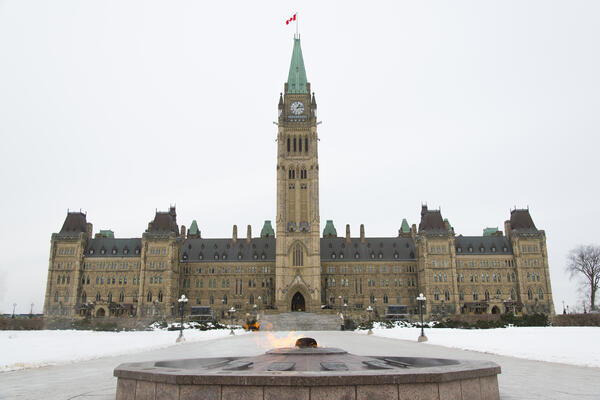
Awards honour two Canadian Nobel laureates
$250,000 award will go to researcher or research team whose work benefitted Canadians in exceptional ways

$250,000 award will go to researcher or research team whose work benefitted Canadians in exceptional ways
By Pamela Smyth Media RelationsThe Natural Sciences and Engineering Research Council (NSERC) announced two awards honouring Canadian Nobel physicists, including one for research impact named after the University of Waterloo’s Donna Strickland.
Strickland, professor in the Department of Physics and Astronomy, won the Nobel Prize in Physics in 2018. The new award, called the NSERC Donna Strickland Prize for Societal Impact of Natural Sciences and Engineering Research is worth $250,000 and will go to a researcher or team of researchers whose work benefitted Canadian society, the environment, or the economy in an exceptional way. The award is open to any NSERC-funded researcher who conducted the research in Canada. It is payable over a period of up to five years.
“Sometimes you don’t realize when you are working on a project just how much of an impact it will have down the road,” said Strickland. “I’m so grateful for the honour of having an award named after me that will go to colleagues who have made really positive contributions with their work.”
Strickland won her Nobel Prize for co-inventing chirped pulse amplification (CPA). CPA enables the most intense laser pulses ever created. It allows for precise, clean cuts that are ideal for transparent materials, such as slicing the cornea as part of corrective eye surgery or machining small glass parts. It revolutionized the field of high-intensity lasers.
“I’m so pleased that NSERC, monumental in its support of Canadian research and researchers, is honouring Professor Strickland in this exceptional way,” said Feridun Hamdullahpur, president and vice-chancellor of Waterloo. “It certainly helps recognize her contributions to Canadians scholarship and it will be a particularly proud day for our campus community when one of Waterloo’s own researchers wins this special award.”
NSERC also announced an award named after Arthur McDonald, an astrophysicist and director of the Sudbury Neutrino Observatory Collaboration, who won the Nobel Prize in Physics in 2015. The Arthur B. McDonald Fellowships replace the E.W.R. Steacie Memorial Fellowships. The awards recognize academic researchers in the natural sciences and engineering who are early in their careers, and support them so that they may become global leaders in their field. The fellowships are worth $250,000 over two years.
McDonald won the Nobel Prize for his groundbreaking discoveries about neutrinos, subatomic particles that are neutral in charge and even smaller than electrons. They are considered the building blocks of the universe. He is professor emeritus at Queen’s University.
“Canadians can be justly proud of our Nobel laureates and I wish to thank both Dr. Strickland and Dr. McDonald for lending their names and their prestige to these prizes.,” said Alejandro Adem, NSERC President. “They are beacons to all of us and an inspiration to both experienced scientists and engineers as well as the students and young researchers they mentor.”
NSERC announced the awards named for Strickland and McDonald on November 25.

Read more
Five researchers at the University of Waterloo were named Canada Research Chairs (CRC) today

Read more
Canada's newest Nobel laureate receives a warm welcome on Parliament Hill.

Read more
Waterloo’s leaders come from all corners of our University and out in the community
The University of Waterloo acknowledges that much of our work takes place on the traditional territory of the Neutral, Anishinaabeg, and Haudenosaunee peoples. Our main campus is situated on the Haldimand Tract, the land granted to the Six Nations that includes six miles on each side of the Grand River. Our active work toward reconciliation takes place across our campuses through research, learning, teaching, and community building, and is co-ordinated within the Office of Indigenous Relations.